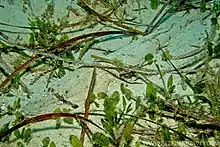| Leviprora | |
|---|---|
 | |
| A well-camouflaged Longhead flathead (Levipora inops) at Albany, Western Australia | |
| Scientific classification | |
| Domain: | Eukaryota |
| Kingdom: | Animalia |
| Phylum: | Chordata |
| Class: | Actinopterygii |
| Order: | Scorpaeniformes |
| Family: | Platycephalidae |
| Genus: | Leviprora Whitley, 1931 |
| Type species | |
| Platycephalus inops | |
Leviprora is a genus of marine ray-finned fishes belonging to the family Platycephalidae, the flatheads. These fishes are endemic to the waters of southwestern Australia.
Taxonomy
Leviprora was first proposed as a monotypic genus in 1931 by the Australian ichthyologist Gilbert Percy Whitley. Whitley designated Platycephalus inops, which had been described by Leonard Jenyns in 1840 from Western Australia, as its type species.[1][2] This genus is classified within the family Playtcephalidae, the flatheads which the 5th edition of Fishes of the World classifies within the suborder Platycephaloidei in the order Scorpaeniformes.[3] The genus name Leviprora is a compound of levis, meaning “smooth”, and prora, which means “prow”, thought to be an allusion to the absence of exposed bony ridges on upper surface of skull in L. inops.[4]
Species
There are two recognised species within the genus Leviprora:[2]
- Leviprora inops Jenyns, 1840 (Longhead flathead)
- Leviprora semermis De Vis, 1883 (Semi-armed flathead)
For a long time L. semermis was considered to be a junior synonym of L. inops but it is now considered a valid species.[5]
Distribution and habitat
Leviprora flatheads are endemic to southwestern Australia where they are found from Shark Bay in Western Australia[6] to Point Dover and Kangaroo Island in the Great Australian Bight in South Australia.[7] These fishes, are found at depths down to 50 m (160 ft), although L. inops may have a preference for shallower waters.[6][7]
References
- 1 2 Eschmeyer, William N.; Fricke, Ron & van der Laan, Richard (eds.). "Genera in the family Platycephalidae". Catalog of Fishes. California Academy of Sciences. Retrieved 11 July 2022.
- 1 2 Eschmeyer, William N.; Fricke, Ron & van der Laan, Richard (eds.). "Species in the genus Leviprora". Catalog of Fishes. California Academy of Sciences. Retrieved 10 July 2022.
- ↑ J. S. Nelson; T. C. Grande; M. V. H. Wilson (2016). Fishes of the World (5th ed.). Wiley. pp. 467–495. ISBN 978-1-118-34233-6.
- ↑ Christopher Scharpf & Kenneth J. Lazara, eds. (7 December 2021). "Order Perciformes (Part 11): Suborder Platycephaloidei: Families Bembridae, Parabembridae, Hoplichthyidae, Platycephalidae and Plectrogeniidae". The ETYFish Project Fish Name Etymology Database. Christopher Scharpf and Kenneth J. Lazara. Retrieved 11 July 2022.
- ↑ Imamura, H. and G. I. Moore (2020). "Taxonomic revision of the flathead genus Leviprora Whitley 1931, with recognition of Leviprora semermis (De Vis 1883) as a valid species (family Platycephalidae)". Ichthyological Research. 67 (2): 275–286. doi:10.1007/s10228-019-00723-8. S2CID 213809319.
- 1 2 CSIRO Marine & Atmospheric Research & Bray, D.J. (2020). "Leviprora inops". Fishes of Australia. Museums Victoria. Retrieved 11 July 2022.
- 1 2 Bray, D.J. (2020). "Leviprora semermis". Fishes of Australia. Museums Victoria. Retrieved 11 July 2022.